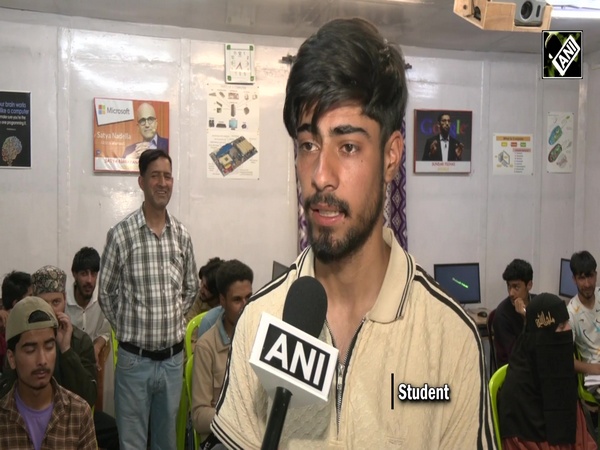Day-long workshop held to design roadmap for Himalayan Agroecology Initiative
Sep 25, 2024

Shimla (Himachal Pradesh) [India], September 25 : To design a roadmap for the Himalayan Agroecology Initiative (HAI), a day-long workshop was held here on Tuesday afternoon where over 175 experts, scientists, environmentalists, farmers, and other stakeholders gathered.
The event, organized by the Alliance of Bioversity International and the International Centre for Tropical Agriculture (CIAT), in coordination with the Himalayan Research Group (HRG), brought together policymakers, government officials, agricultural scientists, and representatives from farmer producers companies, alongside food processing entrepreneurs and progressive farmers from the state.
The organisers and experts suggested a collaborative initiative for sustainability.
HAI aims to promote sustainable agriculture in the Himalayan region and helps farmers become more resilient to climate change while advancing food security.
The initiative focuses on improving food systems governance, ensuring access to natural resources, and promoting healthy diets and cleaner supply chains. It also aims to reduce food loss and waste, using trade to support sustainable development.
The initiative collaborates with governments and a broad group of stakeholders to create agro- ecological food system roadmaps, supporting sustainability and improved livelihoods in India, Nepal, and Bhutan.
The project, spearheaded by the World Future Council, IFOAM-Organics International, and the United Nations Development Programme (UNDP), builds on governmental efforts and international commitments. The day-long workshop here marked the beginning of the roadmap development, with key discussions around agroecological food systems.
Lal Singh, Director of Aayog and the Himalayan Research Group emphasized the importance of gathering baseline data and insights from policymakers and farmers.
"A roadmap is being designed through this workshop," he said, highlighting that this is the first step in creating a comprehensive strategy for sustainable food systems in the Himalayan region.
The roadmaps are based on studies of government policies and their implementation across four Indian Himalayan states: Himachal Pradesh, Uttarakhand, Nagaland, and Meghalaya. The core strategies include enhancing food system governance, improving access to land, water, and healthy soils, and promoting climate-resilient agroecosystems.
The experts have advised the Global and Regional Collaborations for the change in the Himalayan region.
"The Himalayan Agroecology Initiative is supported by organizations such as UNDP and the German-Indian Lighthouse Initiative for Agroecology and Sustainable Resource Management. The initiative is funded by the German Federal Ministry for Economic Cooperation and Development (BMZ) and the International Fund for Agricultural Development (IFAD)," said Lal Singh.
He further added that baseline information is being gathered through consultations with farmers, policymakers, and bureaucrats.
"Farmers, policymakers, and bureaucrats are being consulted to understand current policies and how future programs can align with our food systems," Singh further added.
He also pointed out that the discussions are in response to recent environmental disasters, with a focus on improving water supply, forest biodiversity, and land productivity. The farmers have been looking towards more awareness in this.
Padma Shri awardee Nekram Sharma, a renowned millet farmer, also spoke at the event and urged for a shift towards natural farming. He emphasized the need to reduce pesticide use and adapt to changing environmental conditions.
"In today's context, it is very important to adopt natural farming methods and provide healthy grains by using minimal pesticides," said Sharma.
He warned that current farming practices, driven by scientific developments, could be harmful in the long run. "We are pushing the next generation towards a dangerous future because we haven't treated nature well," Sharma added.
Sharma called on the government to enact stronger laws to control pesticide use and protect the environment.
"Our diet is our medicine, and if the diet is spoiled, everything is spoiled," he added, urging greater awareness of the impact of harmful farming practices.
The Country Representative for India at Biodiversity for Food and Agriculture,said that these workshops would lead the next Steps and Future Outlook.
Dr. J.C. Rana, Country Representative for India at Biodiversity for Food and Agriculture, noted the participation of around 175 experts, including scientists, officials from agriculture and related departments, and representatives from animal husbandry, forestry, and farm producer groups.
He emphasized that the workshop was a part of a global initiative to address the fragile ecosystem of the Himalayan region.
"The objective of this workshop is to prepare a roadmap that benefits our farming community," he said, adding that there are gaps in the implementation of nature farming schemes that need to be addressed in the new roadmap.
With a focus on climate resilience, healthy ecosystems, and sustainable farming, the Himalayan Agroecology Initiative aims to safeguard both the environment and the future of farming communities in India, Nepal, and Bhutan.
The roadmaps, which will be finalized in 2025, promise to offer a comprehensive strategy to improve agricultural practices while protecting natural resources for future generations.




















